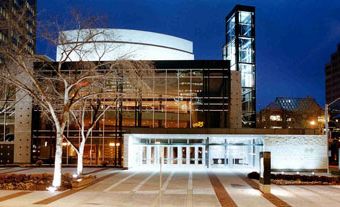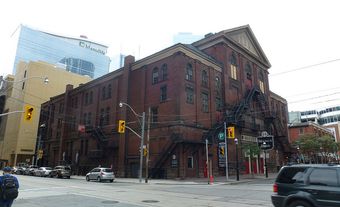
The Carlu
The Carlu (Eaton Auditorium 1931-76). Concert hall and special events facility located on the top (seventh) floor of the former Eaton's College Street store in Toronto. Designed by Jacques Carlu of Paris, with seating for 795 on the main floor and 480 in the balcony, a four-manual 90-stop Casavant organ, and interior appointments in the Art Deco style, the auditorium was built in 1929 as part of the retail complex. See alsoToronto Feature: 444 Yonge Street.
The First Fifty Years
The Eaton Auditorium opened 26 Mar 1931 with a recital by soprano Florence Austral and flutist John Amadio, with Ernest MacMillan at the organ. It was the site of recitals by the leading artists of the day (in 1932-3 Sergei Rachmaninoff, Sophie Braslau, Vincente Escudero, Efrem Zimbalist, and Conchita Supervia; in other years Jussi Bjoerling, Jacqueline Dupré, Duke Ellington, Kirsten Flagstad, Billie Holiday, Fritz Kreisler, Mario Lanza, Frank Sinatra, Lawrence Tibbett, Helen Traubel, Healey Willan); of the Casavant Society organ series (in which Glenn Gould made his recital debut 12 Dec 1945); of various CBC broadcasts; and of countless films and lectures. The Eaton Auditorium was also home to the Eaton Operatic Society, the Kiwanis festivals, the Women's Musical Club of Toronto, and the York Concert Society. The Canadian Opera Company and the National Ballet of Canada staged many of their early productions there. In the late 1940s, the auditorium was described by the noted English musician William Glock as one of the two finest concert halls in Canada (the other being the small concert hall of the Winnipeg Auditorium).
In 1951, permanent theatre seats were installed on a raked floor, and the Eaton Auditorium lost some of its acoustic distinction. With the building of other concert halls in Toronto its use declined in the 1960s and 1970s, and it was closed in 1976 prior to the Eaton's College Street closure 5 Feb 1977. In the ensuing commercial redevelopment of the building by its new owners, Toronto College Park Centre Ltd, the organ was removed and the auditorium's seating was reduced to 1,000. Glenn Gould was the only user of the auditorium at the time, recording there 1971-81.
Managers of the Eaton Auditorium were Paul Johnston 1931-67, a New Yorker of Canadian parentage who had been an impresario before joining the auditorium as booking manager, and John P. Heffernan, who managed the auditorium until the College Street store closed.
Restored and Modernized
Opposition to the owner's proposal to demolish the hall was led by The Friends of the Eaton Auditorium and local preservation groups. Thus began a decade-long debate, that included a 1986 Supreme Court of Canada decision prohibiting demolition. A $12-million plan for the restoration of the auditorium (designated a national historic site in 1983) was accepted by the municipal government 21 Nov 1989 but was not implemented because of a lack of financial support.
An $8.5-million restoration of the Eaton Auditorium was finally begun in 2001 by businessmen Jeffry Roick and Mark Robert; Great West Life Realty Advisors (the building's owners beginning 1997); and Toronto architects ERA Architects Inc and Webb Zerafa Menkes Housden. The auditorium, named The Carlu in honour of its original designer, reopened 1 May 2003.
The venue was restored to maintain its former style yet incorporate 21st century technology, and has been recognized as a fine example of Art Moderne architecture. The Carlu concert hall has a flexible seating capacity of 1,200 (the theatre's raked floor was removed during restoration) and a modernized sound system. A multi-functional hall, it is suitable for a range of events, shows and receptions, as well as theatre and concerts. It has hosted performances by André Laplante, Bryan Adams, the Stuttgart Chamber Choir, and the Toronto Mendelssohn Choir, among others.
See alsoToronto Feature: The Eaton Auditorium.
Suggested Reading
Anderson, Carol and Katherine Mallinson. Lunch with Lady Eaton: Inside the Dining Rooms of a Nation (2004); Hafner, Katie. A Romance on Three Legs: Glenn Gould's Obsessive Quest for the Perfect Piano (2009).

 Share on Facebook
Share on Facebook Share on X
Share on X Share by Email
Share by Email Share on Google Classroom
Share on Google Classroom


